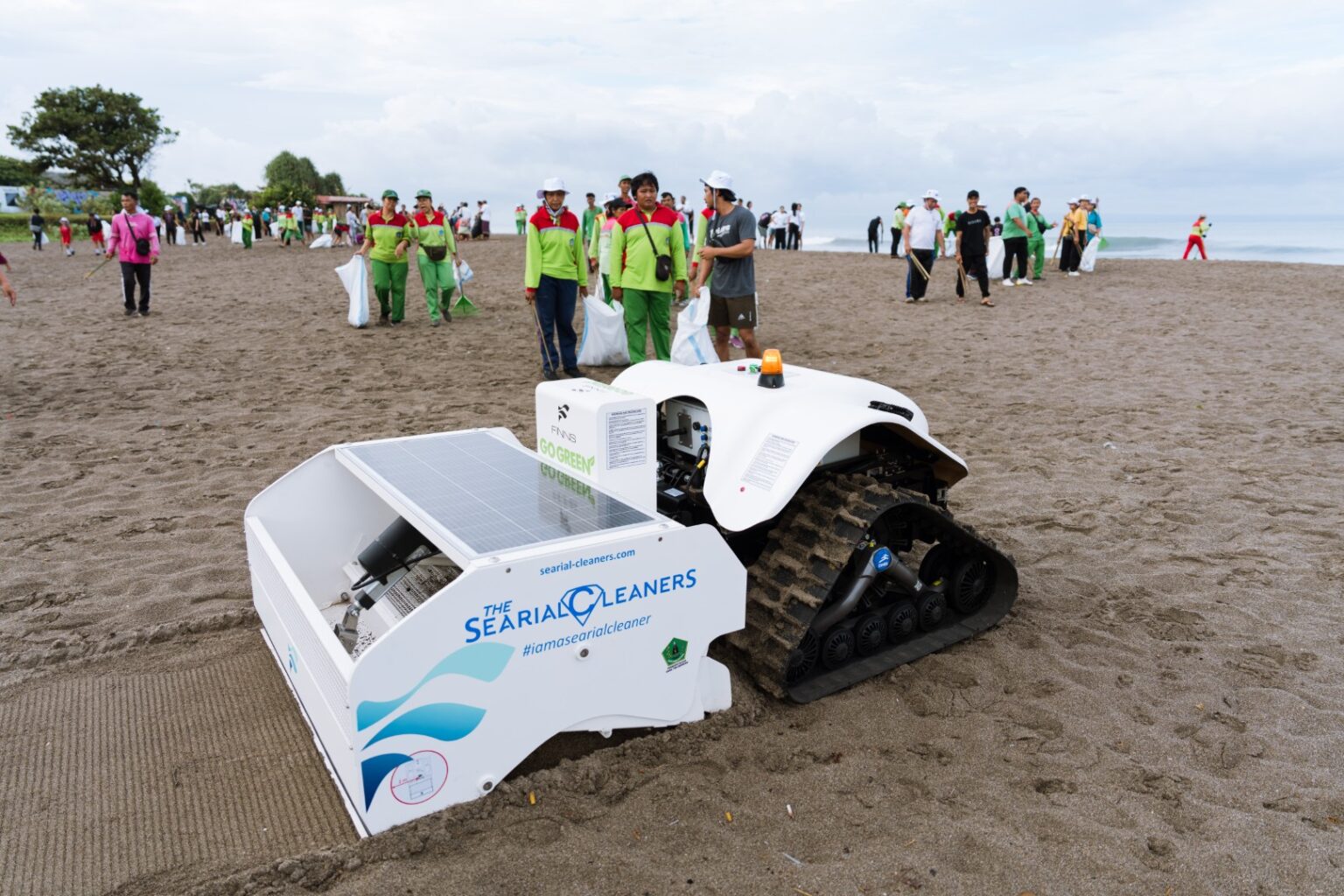For many travelers, Bali is synonymous with white sandy beaches, rolling waves, and exotic tropical views. However, this idyllic image often contrasts with the reality during the west monsoon season.
From October to March, popular beaches such as Kuta, Seminyak, Legian, and Jimbaran are frequently inundated with plastic waste and marine debris carried ashore by ocean currents. This situation disrupts the holiday experience for many visitors.
To address this issue, the Badung Regency Government, in collaboration with private partners, has introduced the Bebot Smart Beach Cleaning Robot.
Powered by solar energy, this robot has been operating for several months at Berawa and Perancak beaches, cleaning up to 180 meters of coastline. Within its trial period, the robot has already shown significant results in reducing waste accumulation on the shore.
Although the price of the robot reaches around USD 65,000 or approximately IDR 1 billion, Badung Deputy Regent, Bagus Alit Sucipta, believes the investment will bring long-term benefits.
“This robot can be a reference for us to develop further. The expectation is that every coastal traditional village will eventually have a tool like this,” Bagus Alit said as quoted from Kumparan.
The beach management company, PT Pantai Semara Nusantara, reported tangible positive impacts. The volume of waste sent to the landfill dropped drastically, from 80 percent to just 20 percent. The target is to further reduce it to only 5 percent by 2025.
Cleanliness as a Tourism Asset
This initiative aligns with Bali Provincial Government’s policy of officially closing Suwung Landfill, one of the island’s largest dumping grounds.
At the same time, environmental NGOs such as Mudfish No Plastic and Sungai Watch have been actively conducting clean-up campaigns and developing recycling systems to better manage plastic waste.
For Bali’s tourism industry, clean beaches are not just about environmental protection, they are central to the island’s reputation as a world-class destination. International tourists expect pristine white sands, free from litter. By combining modern technology, government action, and community involvement, Bali is reaffirming its commitment to sustainable tourism.
“Bali’s tourism is not only about natural beauty, but also about how we take care of it so it remains a paradise on earth,” Bagus Alit emphasized.
How the Bebot Robot Works
Bebot is a small, vehicle-like robot powered by solar panels and batteries. It can collect small pieces of waste buried up to 10 cm deep in the sand. As it moves, the robot not only gathers debris but also smooths and levels the sand, much like manual cleaning with sieving rakes.
Bagus Alit Sucipta, who personally tested the robot at Finns Beach Club in Berawa, sees great potential in this innovation.
“From what I saw, this could be a useful reference for us to study further. This robot can be applied, but with a larger capacity so that it can be provided to each coastal traditional village,” Bagus Alit said on Tuesday, August 19, 2025.
However, he also acknowledged the robot’s limitations.
“We see its potential, but Bebot is not fully optimal. Perhaps later we can use a similar robot with greater capacity so it can collect larger types of waste,” he added.
Currently, Bebot operates about 2.5 hours per day and has already managed to collect around 11,000 waste items, including cigarette butts and microplastics.
Plans are underway to add more robots to cover other beaches in Tibubeneng. In addition to technology, the government encourages tourism operators to adopt more responsible waste management practices.
Many businesses are now sorting and handling their waste independently in accordance with Bali Governor’s directives.
The Role of Environmental NGOs
The initiative is also supported by environmental NGOs. Sungai Watch, for example, has been active in addressing plastic waste in Bali’s rivers and coastal areas.
According to its founder, Gary Bencheghib, the organization collected more than 1 million kilograms of waste in 2024 alone, conducted 503 clean-up activities, and installed 104 trash barriers across waterways.
Between 2020 and 2024, the group successfully collected nearly 2.8 million kilograms of waste, organized over 1,600 clean-ups, and installed 330 barriers.
With this synergy between modern technology, government policy, private sector support, and grassroots initiatives, Bali is taking concrete steps to protect its coastlines. These collective efforts are crucial to maintaining Bali’s image as a clean, beautiful, and sustainable global tourism destination.
Sources : Kumparan.com, Tempo.co
Feat Image : via FinnsBali

